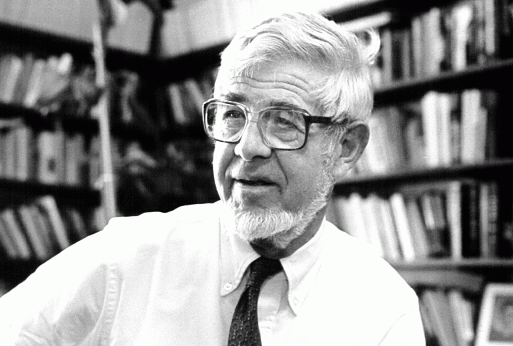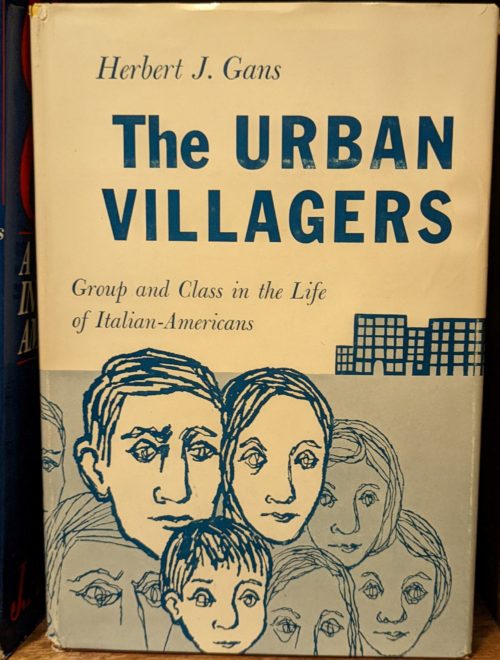Herbert Gans
Herbert Gans lived in the West End for eight months prior to the start of its demolition, conducting sociological research on the culture and lifestyles of the Italian-American residents of the neighborhood. His findings in “The Urban Villagers” presented a significant criticism of Boston’s urban renewal process as inhumane, and Gans notably concluded that planners were incorrect to define the West End, a vibrant community despite widespread poverty, as a slum.
Herbert J. Gans was born in 1927 in Cologne, Germany, and escaped Nazi occupation with his family by moving to England in 1938 and the United States in 1940. Gans became an American citizen in 1945, graduated with a master’s degree in sociology from the University of Chicago in 1950, and received a PhD in planning and sociology from the University of Pennsylvania in 1957. Prior to his PhD, from 1950-1953, Gans worked as a planner for an architectural firm that needed sociological research for the planning of two new towns, and later for the Chicago Housing authority and the U.S. Housing and Home Finance Agency, the precursor to the United States Department of Housing and Urban Development (which would not be founded until 1965).
As a recent graduate, Gans lived in the West End for research purposes from October 1957 to May 1958, to observe and interview the ethnically-diverse working-class community, primarily its Italian-American residents. Gans worked then for the Center for Community Studies, which collaborated with Massachusetts General Hospital and a team led by psychiatrist Erich Lindemann on a project called “Relocation and Mental Health: Adaptation Under Stress.” Lindemann believed that psychiatrists should work with social scientists, such as Gans, city planners, and other “caretaking” agencies to improve mental health services with an understanding of how a community responds to crises and processes grief. The West End was a useful case study once the Boston Redevelopment Authority designated the neighborhood a slum in 1953; Gans chose his time of arrival to collect data before the demolition of forty-eight acres of the West End began. He used the method of participant-observation to gain an understanding deeper than what surveys alone could offer.
Gans’ objective was not simply to conduct detailed interviews, but to “know what a slum was like, and how it felt to live in one”; immersion in the West End would help Gans test the assumption, held by the emerging social psychiatry field, that a dilapidated built environment and poor living conditions cause mental illnesses. Gans’s findings, which culminated in his ground-breaking book The Urban Villagers: Group and Class in the Life of Italian-Americans (1962) disputed conventional wisdom: “The West End was not really a slum, and although many of its inhabitants did have problems, these did not stem from the neighborhood.” The West End was a vibrant community in spite of the American Public Health Association metrics that urban planners relied upon, such as housing quality, density levels, and sanitation. Crucial to Gans’ observations is his description of the West End as a “peer-group” society, where sex-divided groupings of the boys and girls one grew up with were the strongest source of social ties. In Gans’ words, “It does not generally involve the kind of interpersonal intimacy between two people that we are so familiar with in the middle class although it is certainly as close, as warm, and probably includes a wider set of reciprocal obligations.” These peer groups were not only residents’ primary emotional support system, but also tied to the spaces that were since demolished. The dispersed relocation of West Enders throughout Greater Boston was an enormous source of grief and loss for old residents, which suggested that urban renewal programs implemented poorly would have serious consequences for the mental health of poor and minority communities.
Gans’s position in The Urban Villagers had a mixed reception in the academic community, but it inspired members of the public. Gans commented that the book meant he was “considered a heretic by many of my colleagues in the planning profession” – since he challenged prevailing understandings of slums – but he had inspired Jane Jacobs, a notable critic of urban renewal, to visit the North and West End. Gans was not entirely opposed to urban planning in all cases, but he believed, as he argued in a 1968 paper called “Planning for people, not buildings,” that urban planning should be less preoccupied with physical environments and more concerned with “[helping] people solve their problems and realize their goals.” His social justice-oriented research and teaching continued as a professor of Urban Studies at the University of Pennsylvania until 1964, a brief appointment at MIT, and a professorship at Columbia University that he has held since 1971. Gans is no longer a full-time teacher, instead a full-time writer, and has produced over a dozen books and more than one-hundred-and-seventy articles. As a professor emeritus, he continues teaching the “Field Methods” course in the Sociology department at Columbia.
Article by Adam Tomasi
Source: The Urban Villagers: Group and Class in the Life of Italian-Americans by Herbert Gans; Encyclopedia.com; American Sociological Association; Columbia University; “Herbert J. Gans: An Introduction” by Sudhir Venkatesh and Eva Rosen; “Planning for people, not buildings” by Herbert Gans (ALCAN Conference, London, 1968); “Remembering the West End: social science, mental health and the American urban environment, 1939-1968,” by Edmund Ramsden and Matthew Smith.









